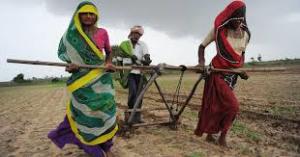Is there time to think of agriculture and farmers?
Yes, much has been talked about farmers, their own tales of woe and tonnes of promises to help them etc.
Rahul Gandhi has promised the moon, all farmers’ loans he promises to wipe out!
 As for the BJP, the Prime Minister has vowed to protect farmers, he is the chowkidar and the country is safe in his hands. As we said this is election time and you can believe or disbelieve as you want.
As for the BJP, the Prime Minister has vowed to protect farmers, he is the chowkidar and the country is safe in his hands. As we said this is election time and you can believe or disbelieve as you want.
But one thing is fundamental. Agriculture is to stay here and agriculture would matter who is in power or out of power. Agriculture and food production are intertwined. Only when there is enough food in the country the country is safe. Once food shortages arise then everything goes wrong.
Unfortunately, there is a series of issues, drought, climate change; uncertain rains and water crisis, from drinking water to water for irrigation are all coming increasingly to our day to day deliberation’s we write, this is world water day!
And remember the place of agriculture is now at the very centre stage of international attention. Agriculture is first and foremost and international topic, on agriculture production, export and trade international diplomacy revolves!
So, the current issues of agriculture have a long history. For a change we can discuss the history of agriculture and the world population is also bringing agriculture to our attention. World population is 9 billion; this would be in about the next few years, by 2050, hardly one generation. An estimate says that in 2013, it was 2,700 calories for each of the 7 billion people on the earth and by 2050 2,000 calories per head is adequate for survival.
Even as we write there are food shortages in South America and also in North Korea.
There are already many international agencies, from UN to FAO and other bodies to reach out the hungry and ill-fed. However, there are road blocks, trade barriers, US and China are at almost war over trade issues and we don’t know how the equitable distribution of food would contribute to world peace and human contentment.
There are also many trade blocs, European bloc being the world’s most important food importer and with the British exit, there could be many more rules change. Poverty is still there developing countries and India, now a reasonably self-sufficient country in food requirements but scenarios can change drastically.
Unfortunately, Indian farmers are more neglected and more exploited and there is an unbridgeable divide between the urban and rural peoples’ welfare and security. The Indian farmer is a big tragic figure, he is either a debtor or a litigant. He is the most insecure citizen and he is being pampered by the politicians for the simple reason in India fifty percent of the population is still dependent upon farming as a source of employment.
And the divide between rural India and the urban India is widening and no adequate answer, less a grand vision for India’s future agriculture is in sight. We need more and more powerful farm lobbies, as we have in the USA and UK. A powerful agriculture lobby is critical and only then we can get the farming community to get the needed subsidies and protection as enjoyed in advanced countries.
Our farmers lobbies must travel abroad, more and more to advanced agriculture economies and see how the agri subsidies work there. May be our government too is coming round to see new policies needed. Like basic universal incomes, a sort of minimum social security.
Unfortunately, there is now a type of mindset on the part of policy makers to take Indian farmers indolence as passivity. Change must be invoked in every farmers mind and farmer’s power has to be reused.
We need good and committed farmers leader and election time is the right time to pressure the politicians. There is a range of farm issues, from developed countries like USA and UK where big farms survives, in the USA 80% of farm output comes from 10% of the big farms, whereas, as in India, why even in the most backward Maasai pastrolists in Tanzania where small farmers believe they want to inherit the farms from their parents and they in turn want to hand over the farms to their successors. So too in certain manner in India too the farmers’ future depends upon how tradition and history would govern the farmers families and their inheritance.
Farm sizes is another big issues. In India, the British rule and their ryotwari system of ownership and also the creation of Zamindari, from the Mughal times’s mansabdari system and Taluqdars, there is a strong tradition of feudalism. This you can wipe out even in one generation.
That is one more reason why litigation, the pending of court cases relating to land is so persistent. Also the fact you can’t have equal land size however much you strengthen the land reform laws, land tenancy laws.
There would be one or two big land owners in every village in India. The rest would be small farmers. Can you distribute the agricultural land as in a collective, Soviet style farming system?
These issues have to be debated openly. Indian agriculture doesn’t have a strong media space. Vadamalai Media would continue to fight for an open society, liberal economic and social policies.